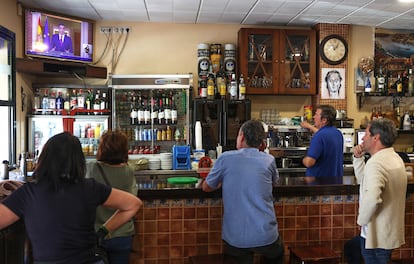Spain’s Pedro Sánchez decides not to resign: ‘Let’s show the world how democracy is defended’
The PM says he will be ‘stronger’ and fight what he describes as a harassment campaign against his wife that is part of a larger reactionary movement spreading in Spain and the world

Spain’s prime minister, Pedro Sánchez of the Spanish Socialist Party (PSOE), on Monday morning confirmed that he has decided not to resign, to stay at the helm of government and to keep going “stronger” than ever, following five days of uncertainty about his political future.
However, his address did not explain what his plan will be from now on, and whether anything will change. He did not mention any of the initiatives that had been the subject of speculation in recent days, such as the possibility of submitting to a confidence vote in parliament.
His decision to take a break from all official engagements on Wednesday came after a court opened an initial inquiry into his wife, Begoña Gómez, over corruption allegations. The accusation was brought by an association called Manos Limpias (Clean Hands) with ties to the far right and a history of bringing legal action against left-wing leaders. Sánchez last week described the move against his wife as “a harassment campaign.”
On Monday, Sánchez said that the shows of support from party officials and from grassroots sympathizers over the last five days had helped him make the decision to stay at the helm of his center-left coalition government.
“My wife and I know that this discrediting campaign will not end. We have been suffering it for 10 years. It is serious, but it is not the most relevant thing. We can overcome it,” he said from La Moncloa, the seat of government. “The important thing is that we want to thank the shows of solidarity that came from all sides. Thanks to this mobilization, I have decided to stay.”
Sánchez’s address was also an appeal to progressive forces to mobilize as a result of the growing polarization of Spanish politics and beyond. “This is not about the fate of any individual leader. This is about deciding what kind of society we want to be. I ask Spanish society to once again be an example and a role model for a convulsed, hurting world. The ills that plague us are part of a global reactionary movement that seeks to impose its regressive agenda through slander and falsehood, through hate, and by playing on fears and threats that are not backed by science or rationality. Let’s show the world how democracy is defended.”

On Wednesday, following the opening of the inquiry into his wife, Sánchez locked himself away with his family and drafted a letter stating that he was seriously considering resigning after the “unprecedented attacks” against his wife. “I need to stop and reflect. I have to answer the question of whether it is worth it, whether I should continue at the head of the government or resign from this honor,” the president said in a “letter to citizens” posted on the social network X, without an official letterhead — a sign that it was a personal matter.
The inquiry is the result of a complaint filed by an ultra-conservative group whose leaders have in the past been sentenced to jail (and later acquitted) for extorting money from financial institutions.
Sign up for our weekly newsletter to get more English-language news coverage from EL PAÍS USA Edition
Tu suscripción se está usando en otro dispositivo
¿Quieres añadir otro usuario a tu suscripción?
Si continúas leyendo en este dispositivo, no se podrá leer en el otro.
FlechaTu suscripción se está usando en otro dispositivo y solo puedes acceder a EL PAÍS desde un dispositivo a la vez.
Si quieres compartir tu cuenta, cambia tu suscripción a la modalidad Premium, así podrás añadir otro usuario. Cada uno accederá con su propia cuenta de email, lo que os permitirá personalizar vuestra experiencia en EL PAÍS.
¿Tienes una suscripción de empresa? Accede aquí para contratar más cuentas.
En el caso de no saber quién está usando tu cuenta, te recomendamos cambiar tu contraseña aquí.
Si decides continuar compartiendo tu cuenta, este mensaje se mostrará en tu dispositivo y en el de la otra persona que está usando tu cuenta de forma indefinida, afectando a tu experiencia de lectura. Puedes consultar aquí los términos y condiciones de la suscripción digital.








































